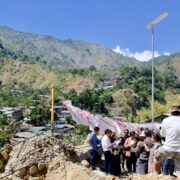Batang Pinoy and Baguio’s good governance

In sports, we often celebrate the medals but overlook the journey. We applaud the champions on the podium, share their photos, and claim their victories as symbols of local pride. Yet behind every medal is a story of preparation, resources, care, and sometimes, neglect. “Batang Pinoy” may not have only told us which cities have the best athletes but also uncovered which “good governance” is focused toward the welfare of the people and bringing the best out of them.
The richest city outside Metro Manila, Baguio, ranked number one in the unofficial medal tally of Batang Pinoy 2025 as of Nov. 3, followed by another wealthy city, Pasig. Unfortunately, the first place was snatched again by Pasig in the final medal tally, making it their second year of breaking Baguio’s previous winning streak. Note that both cities proudly champion good governance. However, I find it ironic that the richest city outside Metro Manila can’t even extend proper comfort and attention to the very athletes that they proudly feature in the Baguio City Public Information Office. Could it be that the Baguio delegation could have secured the first place only if they were given proper support? For the “City of Fines,” money is definitely not a problem, but prioritization is.
Pasig’s athletes were shuttled to the airport and housed in the four-star Greenleaf Hotel Gensan, complete with access to a pool for recovery after games, as seen in the Facebook post of Pasig Sports Karate. Meanwhile, according to an interview with a Baguio athlete and coach, they had to arrange their own transport, sleep on classroom floors, and even line up just to use a single comfort room. The lack of institutional attention extended beyond the athletes. Even coaches that were tasked to train champions were forced to shoulder responsibilities that the city could have managed.
Baguio is currently operating on a P3.6 billion budget approved by the local legislative body as the city’s annual budget. Definitely an extra expense for the comfort of the athletes will not hurt the entire budget. In fact, it will even help them be true to their words in claiming to aim to maintain being the “Education Center of the North.”
Sleeping on the floors and fighting for one comfort room may be framed as part of the experience of having a “resilient Filipino spirit,” but it should not always be the case, especially if their city has the resources to provide them the ease they deserve. The official competition dates of Batang Pinoy were announced on May 20 by the Philippine Sports Commission, long enough for the city to arrange buses that will transport the Baguio delegation to the airport and house them in a more comfortable place.
Coaches became travel agents, coordinators, and guardians on top of what their job description says, when in fact the city has its own councilor for sports that has the manpower to arrange it themselves and at least, lift these worries from the coaches’ shoulders. Instead of directing their focus on guiding the athletes, coaches were left to make amends on how they would even reach General Santos City and bring the medals back home.
Even as Mayor Benjamin Magalong and other city officials and city sports council officers graced the opening ceremonies, their presence could not make the beds of the athletes softer as they lay in their mats spread across classroom floors.
Although athletes and coaches were grateful for the support that they received, such words reveal that even the bare minimum now feels like a privilege. Lifted worries of transportation from their shoulders, a proper rest, and a city that recognizes their fullest potential could have brought out the best version of these talented athletes. Only if their attention was solely allotted to training and making sure that they will be in their best condition, maybe, just maybe, they could have had the victory they haven’t tasted since 2023.
I admire that they are still grateful for what was given to them. They were glad that at least this time, there were more athletes sent to Batang Pinoy. At least this time, they were able to compete without pulling out the majority of the cost from their own pockets. Nonetheless, even though the support finally reached the bare minimum, athletes with such talents shouldn’t be forced to endure a support that gives them just enough when the giver expects them to give their all, or even beyond their capacities. Athletes are not asking for too much compared to what they give.
Baguio’s athletes may have brought home the medals, but their journey exposed the cracks in the city’s priorities. Real victory lies not only in the medals and the applause given to them. It also lies in how the people who earned them were cared for. After all, good governance should not only be seen in posts and heard in speeches, but in how leaders show up when no one is watching. If Pasig could ensure comfort, what hindered Baguio—with more than enough resources—from providing similar care?
—————-
Ruth Jedidiah L. Durolfo is a journalism major at the University of the Philippines Baguio.

















